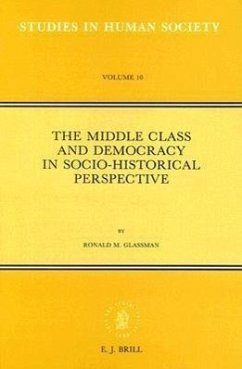One of the basic theories of politics, put forth by Aristotle centuries ago, is the theory of the middle class and its causal link with democracy. According to Aristotle, a large, prosperous middle class may mediate between rich and poor, creating the structural foundation upon which democratic political processes may operate. Beyond Aristotelian theory, the specifically commercial nature of the middle class is also made central, as the democratic institutions of law, power limitation, and electoral participation were carried by a commercial middle class. This volume traces the development of democracy and the rise of the commercial middle class from ancient Greece to Renaissance Italy, to post-feudal Europe. Socialism, communism and fascism are discussed as reactions to capitalist-democracy. The book concludes with an analysis of the structural and cultural bases of democracy.
Hinweis: Dieser Artikel kann nur an eine deutsche Lieferadresse ausgeliefert werden.
Hinweis: Dieser Artikel kann nur an eine deutsche Lieferadresse ausgeliefert werden.








